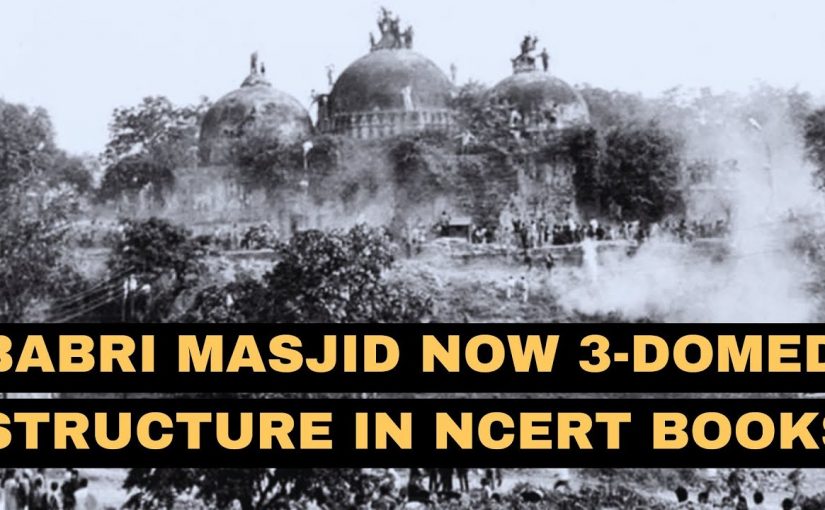By Rajan Narayan
THE new National Council of Educational Research and Training (NCERT) glorifies the construction of the Ram Mandir in Ayodhya by Narendra Modi. The Supreme Court judgment which cleared the construction of the Ram Mandir is also highlighted in the Std 12 political science textbooks introduced by the NCERT from the current year.
Conversely, all references to the demolition of the Babri Masjid and the post-Godhra communal riots in 2002 have been removed from the history and political science text books. Any references to the terror attacks in Mumbai following the demolition of the Babri Masjid have also been left out. Going even further back the textbooks have dropped all mention of LK Advani’s historic Ram Janmabhoomi Yatra undertaken in 1992. It was Narendra Modi who drove the chariot of LK Advani to Ayodhya. It may be recalled that the Ram Janmabhoom Yatra of LK Advani resulted in the demolition of the Babri Masjid. The Ram Mandir was built on the site of the demolished Babri Masjid in 2023. The “prana pratishtha” or consecration of the new Ram Mandir built at a cost of Rs500 crore was done by Narendra Modi.
JUSTIFICATION BY SAKLANI
THE justification of Dinesh Prasad Saklani for removing references to the Babri Masjid demolition and the Gujarat riots is that teaching about riots can create violence and depress citizens. Saklani insists that such episodes were aberrations and should not be taught in schools. “Why should we teach about riots in school text books? We want to create positive citizens and not violent and depressed individuals.” “Should we teach our students in a matter that they become offensive, create hatred in society or become victims of hatred. Is that the purpose of education? When they grow up they can learn about it. But why school text books? Let them understand what happened and why it happened when they grow up.”
Never mind that it was it was the hate generated by the Ram Janbhoomi Yatra which led to the demolition of the Babri Masjid and the riots in Gujarat. The demolition of the Babri Masjid divided the country on communal lines. It marked the targeting of Muslims and Christian communities by the Modi government. It led to the creation of the “nafrat ka dukan” by the Bharatiya Janata Party. The new NCERT textbooks are an attempt to re-write history to give the BJP a clean chit in the demolition of the Babri Masjid and the violence that followed. The comments by Satlani come at a time when the new textbooks have hit the market with several deletions and changes. The new political science Std 12 test books refer to Babri Masjid as the three-domed structure.
The demolition of the masjid has been dismissed in one paragraph. But there is no reference to the Babri Masjid being brought down by Hindu activists in December 6, 1992. The focus instead is on the consecration of the new Ram Lalla idol in the Ram Temple on January 22, 2024. Interestingly, the BJP candidate was defeated by Ayodhya’s backward class dalits representing the Samajwadi party in the recently over parliamentary elections. Several airlines which had started flights to Ayodhya have discontinued them for want of adequate customers for Ayodhya Ram Temple pilgrimage.
The new textbooks also highlight the construction of the new parliament building by Narendra Modi. They also talk about development carried out by Modi. The textbooks were published before the outcome of the results of the parliamentary election much to the embarrassment of the government and they carry a chapter on Modi’s guarantees of reducing poverty and providing benefits to all sections of society.
The new textbooks also focus on the achievements of ancient India. Ranging from the archaeological remains of the Indus valley civilization in Haryana. The new text books also contain references of the achievements of the Vedic people of ancient India. The NCERT textbooks have a lot of references to the scientific achievements of ancient India or Bharatdesh.
Citing the iron pillars put up by Emperor Ashoka, the new textbooks insist that India was aware of metallurgy way back in the time of Emperor Ashoka (dating 268 BCE to 232 BCE). There is also a reference to the Pushpak Vimana of the Ravana king of Lanka to dramatize even more ancient India’s achievements in aviation. Never mind this amounts to glorifying King Ravana of the epic “Ramayana.” Mythology is being treated as historical fact by the NCERT.
Again in an attempt to rewrite history a section of the history book devoted to the Mughal empire has been eliminated . More specifically a table on the achievements of great Moghul emperors like Babur, Humayun, Akbar, Jehangir, Shah Jahan, Aurangazeb. Instead there is more focus on the Pushyabhupi or Vardhana dynasty emperor Harshvardhan who ruled in the 5th century CE.
SOME BASHING
THE new textbooks also do some bashing of the Congress and other Opposition parties of today. The textbooks claim that the INDIA group parties favor Muslims. To be more specific the Std 11 and 12 textbooks say that political parties “give priority to minority groups with an eye on vote bank politics which led to minority appeasement.” This marks a complete shift from what was taught in 2023-2024 academic year with the new textbooks now dated for 2024-2025.
What is wrong about changes in education textbooks? Updates in education textbooks is a global practice. It is in the interests of education. Whatever is changed is decided by experts. Before being appointed chairperson of the National Council of Education Research Suklani headed the ancient Hinduism department of the Beneras Hindu University.
Dropping references to the demolition of the Babri Masjid, the killing of Muslims in Gujarat, and the Hindutva agenda and even rewriting the history of Manipur, are part of the BJP’s plan to whitewash records of Islamophobia on the part of the party and talks by the prime minister, Narendra Modi.
